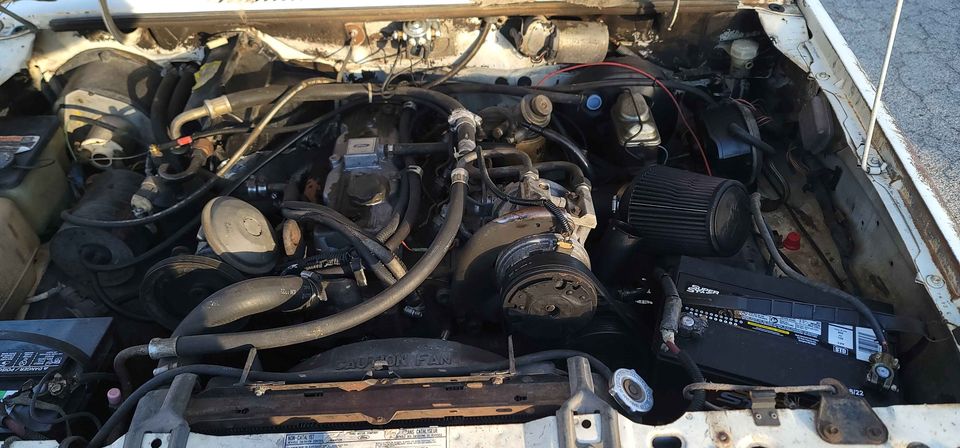How the 2.2 Ford Ranger Engine Delivers Power and Efficiency for Your Truck
How the 2.2 Ford Ranger Engine Delivers Power and Efficiency for Your Truck
Blog Article
What Makes an Automobile Engine Run Smoothly: Leading Tips for Ideal Treatment
The smooth procedure of a cars and truck engine is fundamental to both efficiency and durability, making ideal care an important responsibility for lorry owners. What details steps should you focus on to guarantee your engine remains in peak condition?
Normal Oil Adjustments
One of one of the most essential facets of auto maintenance is guaranteeing your engine receives regular oil changes. Engine oil lubricates internal parts, decreases rubbing, and assists preserve optimal operating temperatures. In time, oil degrades due to warm, impurities, and the natural byproducts of combustion, resulting in minimized performance and potential engine damages.
Most makers suggest altering the oil every 5,000 to 7,500 miles, however this period can differ based upon driving conditions and oil type. For example, synthetic oils may enable longer periods between adjustments. Routine oil changes not only boost engine efficiency but also enhance gas performance, as tidy oil promotes smoother procedure.
Neglecting oil modifications can lead to sludge accumulation, which harms circulation and can cause serious engine issues. It is crucial to inspect oil degrees regularly and monitor for any kind of unusual changes in color or consistency, which could suggest contamination or degradation.

Maintaining Coolant Levels
Preserving proper coolant levels is crucial for avoiding engine getting too hot and making sure optimum performance. The coolant, commonly a blend of water and antifreeze, flows via the engine, taking in warmth and stopping thermal stress. Not enough coolant can result in increased engine temperatures, which may trigger serious damages or perhaps total engine failure.
To keep optimal coolant levels, frequently inspect the coolant storage tank, usually located in the engine bay. Ensure the coolant is loaded to the suggested mark, as shown in your car's proprietor manual. It is a good idea to examine the degrees at the very least as soon as a month or eventually journeys, specifically throughout extreme climate problems.
If you discover that the coolant degree is continually low, there might be a leak in the air conditioning system, which must be resolved promptly to stop more problems. 2.2 ford ranger engine. In addition, flushing the coolant system every 2 to 3 years can assist eliminate any type of accumulated debris and ensure reliable warm exchange
Checking Air Filters

It is recommended to examine the air filter every 12,000 to 15,000 miles, or a lot more regularly if driving in damaging or dirty problems. A simple aesthetic examination can usually expose whether the filter is filthy or damaged. If the filter shows up tarnished or has visible dust accumulation, it needs to be replaced promptly.
Using a premium air filter designed for your specific automobile design can further improve engine performance. In addition, some automobiles might profit from multiple-use filters that can be cleaned and re-installed, providing a environmentally friendly and cost-efficient option.
Inspecting Spark Plugs
Ignition system are crucial elements of a vehicle's ignition system, directly influencing engine performance and efficiency. They produce the trigger that fires up the air-fuel blend in the burning chamber, helping with the engine's power generation. Normal assessment of stimulate plugs is important see for maintaining optimal engine function and stopping possible problems.
Throughout an assessment, look for signs of wear or damage, such as fractures, carbon build-up, or too much void widening. A healthy and balanced trigger plug typically shows a brown or tan shade. Dark residue or oil down payments can show incorrect burning, while a white or raw look might suggest overheating. Both conditions require instant focus to avoid further engine damage.
It's advisable to description evaluate stimulate plugs every 30,000 miles, or as advised in your lorry's owner guidebook. In addition, take into consideration changing them according to the maker's guidelines, as old or used ignition system can cause misfires, decreased gas performance, and raised discharges.
Tracking Tire Pressure
Making certain correct tire stress is a critical aspect of automobile safety and efficiency. Under-inflated tires can bring about lowered fuel effectiveness, increased tire wear, and endangered handling. Alternatively, over-inflated tires can lower grip and enhance the risk of blowouts. Therefore, regular tracking of tire stress is essential for ideal automobile procedure.
Tire pressure must be checked at the very least when a month and eventually trips. Make use of a dependable tire stress gauge to determine the pressure when the tires are cold, preferably before the automobile has actually been driven for a minimum of three hours. Describe the vehicle's owner manual or the placard located on the driver's side door jamb for the producer's recommended stress levels.
It is very important to keep in mind that tire pressure can fluctuate with adjustments in temperature level; a decrease of 10 ° F can result in a 1-2 psi reduction in stress. Additionally, visually inspect tires for any type of indications of wear or damages throughout your monitoring regimen. Keeping appropriate tire stress not just click reference enhances automobile safety and security however likewise enhances fuel effectiveness and extends tire life, ultimately adding to a smoother engine performance.
Verdict
In conclusion, preserving an auto engine's smooth procedure calls for thorough attention to a number of essential variables. Eventually, a positive strategy to engine care is important for making sure integrity and performance over time.
One of the most crucial aspects of vehicle maintenance is guaranteeing your engine gets routine oil changes. Engine oil lubricates inner parts, decreases friction, and aids maintain ideal operating temperature levels. Regular oil modifications not only improve engine performance but additionally improve gas effectiveness, as tidy oil advertises smoother procedure.
Not enough coolant can lead to enhanced engine temperatures, which may trigger severe damages or even total engine failure.

Report this page